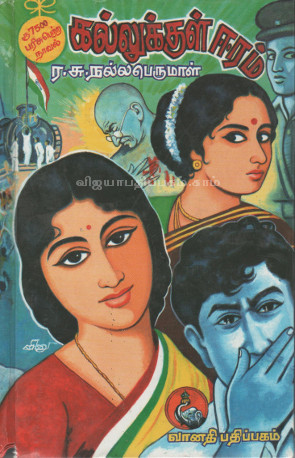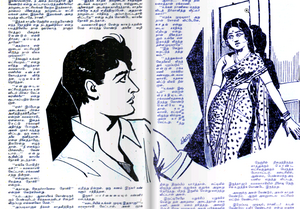Kallukul Eeram: Difference between revisions
No edit summary |
(Changes reflecting tamil wiki article) |
||
| Line 1: | Line 1: | ||
{{Read Tamil|Name of target page=கல்லுக்குள் ஈரம்|Title of target page=கல்லுக்குள் ஈரம்}} | {{Read Tamil|Name of target page=கல்லுக்குள் ஈரம்|Title of target page=கல்லுக்குள் ஈரம்}} | ||
[[File:Kallukkul.jpg|thumb|கல்லுக்குள் ஈரம்]] | |||
[[File:Kallukkuliiram1.png|thumb|கல்லுக்குள் ஈரம்.கல்கி]] | |||
''Kallukkul Eeram'' is a novel written by R.S. Nallaperumal. It is written with Gandhi’s assassination as the backdrop; depicting the final stages of the Indian Independence Movement from a Gandhian’s perspective. | ''Kallukkul Eeram'' is a novel written by R.S. Nallaperumal. It is written with Gandhi’s assassination as the backdrop; depicting the final stages of the Indian Independence Movement from a Gandhian’s perspective. | ||
== Writing, Publication == | == Writing, Publication == | ||
R.S. Nallaperumal researched the history of Gandhi's assassination and used it as the backdrop for the novel. ''Kallukkul Eeram'' won the second prize in the Kalki Magazine Novel Competition in 1966. It was later published in 1969. | R.S. Nallaperumal researched the history of Gandhi's assassination and used it as the backdrop for the novel. ''Kallukkul Eeram'' won the second prize in the Kalki Magazine Novel Competition in 1966. It was later published in 1969. | ||
Fourth edition of this novel came out in 1997. In the preface to this edition, the author expressed | Fourth edition of this novel came out in 1997. In the preface to this edition, the author expressed his sentiments as follows: | ||
his sentiments as follows: | |||
‘Our revolution for independence, the revolutionaries, their determination and sacrifices | ‘Our revolution for independence, the revolutionaries, their determination and sacrifices | ||
| Line 12: | Line 12: | ||
this novel are withering now, considering our country’s decadence.’ | this novel are withering now, considering our country’s decadence.’ | ||
== Synopsis == | == Synopsis == | ||
Rangamani, the protagonist, witnessed his father’s murder who was beaten to death by the British for being a friend to V.O. Chidambaram Pillai. A family friend, named Dikshitar, took him to Gandhiji to reform his vengeful and violent attitude. Gandhi gave him a Jesus cross as a gift which he treasured until his adulthood. However, Rangamani was stubborn to avenge his father’s death. He discontinued law school and joined an extremist group. Triveni, the daughter of the extremist group’s leader, was a believer in | Rangamani, the protagonist, witnessed his father’s murder who was beaten to death by the British for being a friend to V.O. Chidambaram Pillai. A family friend, named Dikshitar, took him to Gandhiji to reform his vengeful and violent attitude. Gandhi gave him a Jesus cross as a gift which he treasured until his adulthood. However, Rangamani was stubborn to avenge his father’s death. He discontinued law school and joined an extremist group. Triveni, the daughter of the extremist group’s leader, was a believer in Gandhian principle of ahimsa. Rangamani had a change of heart after seeing Triveni’s sacrifice. As per Triveni’s request, Rangamani went to meet Gandhi and witnessed the assassination of Gandhi. The idol of the cross was bathed in blood as he attempted to hold him. | ||
== | == Controversies and Recognitions == | ||
The leader of the Tamil Tigers, V. Prabhakaran named Kallukkul Eeram as one of his favourite books<ref>[https://frontline.thehindu.com/world-affairs/we-will-fight-for-our-political-objective-v-prabakaran/article6808332.ece We will fight for our political objective: V. Prabakaran, Frontline, September 1987]</ref>. The story of ''Hey Ram'' the Tamil movie written and directed by [[Kamal Haasan]] was regarded as almost the same as that of ''Kallukkul Eeram''. While the resemblance was coincidental, the filmmakers later obtained written permission from R.S. Nallaperumal. | |||
This novel was | ==Literary Standing-- | ||
Scepticism formed around the Gandhian movement in the 1950s. Subsequently, there were works written that ''rediscovered'' Gandhi. Kallukkul Eeram was one of them. This novel creates an analogy between Gandhi’s blood being a liberating force like Jesus Christ’s blood. It also recognizes how Gandhi, a human being, was viewed as a divine power within twenty-five years of his demise. The story of Hey Ram, the movie released in 2000, resonates with the theme of Kallukkul Eeram; it depicts the same emotions and symbolic representations as Kallukul Eeram. | |||
== References == | |||
* [https://rengasubramani.blogspot.com/2021/05/blog-post_19.html Rangasubramani: Kallukkul Eeram - R.S. Nallaperumal] | |||
* [https://vasagarkoodam.blogspot.com/2014/06/kallukkul-eeram.html Vasagar koodam: Kallukkul Eeram - R.S. Nallaperumal] | |||
*[https://www.geotamil.com/index.php/2021-02-10-13-39-56/247-2011-06-30-01-12-52 Kallukkul Eeram - V.N. Giritharan] | |||
== Notes == | |||
<references /> | |||
{{Being created-en}} | {{Being created-en}} | ||
[[Category:English Content]] | [[Category:English Content]] | ||
Revision as of 14:55, 1 August 2022
இந்தப் பக்கத்தை தமிழில் வாசிக்க: கல்லுக்குள் ஈரம்
Kallukkul Eeram is a novel written by R.S. Nallaperumal. It is written with Gandhi’s assassination as the backdrop; depicting the final stages of the Indian Independence Movement from a Gandhian’s perspective.
Writing, Publication
R.S. Nallaperumal researched the history of Gandhi's assassination and used it as the backdrop for the novel. Kallukkul Eeram won the second prize in the Kalki Magazine Novel Competition in 1966. It was later published in 1969.
Fourth edition of this novel came out in 1997. In the preface to this edition, the author expressed his sentiments as follows:
‘Our revolution for independence, the revolutionaries, their determination and sacrifices gave me the inspiration to write this novel. The hopes and the enthusiasm with which I created this novel are withering now, considering our country’s decadence.’
Synopsis
Rangamani, the protagonist, witnessed his father’s murder who was beaten to death by the British for being a friend to V.O. Chidambaram Pillai. A family friend, named Dikshitar, took him to Gandhiji to reform his vengeful and violent attitude. Gandhi gave him a Jesus cross as a gift which he treasured until his adulthood. However, Rangamani was stubborn to avenge his father’s death. He discontinued law school and joined an extremist group. Triveni, the daughter of the extremist group’s leader, was a believer in Gandhian principle of ahimsa. Rangamani had a change of heart after seeing Triveni’s sacrifice. As per Triveni’s request, Rangamani went to meet Gandhi and witnessed the assassination of Gandhi. The idol of the cross was bathed in blood as he attempted to hold him.
Controversies and Recognitions
The leader of the Tamil Tigers, V. Prabhakaran named Kallukkul Eeram as one of his favourite books[1]. The story of Hey Ram the Tamil movie written and directed by Kamal Haasan was regarded as almost the same as that of Kallukkul Eeram. While the resemblance was coincidental, the filmmakers later obtained written permission from R.S. Nallaperumal.
==Literary Standing-- Scepticism formed around the Gandhian movement in the 1950s. Subsequently, there were works written that rediscovered Gandhi. Kallukkul Eeram was one of them. This novel creates an analogy between Gandhi’s blood being a liberating force like Jesus Christ’s blood. It also recognizes how Gandhi, a human being, was viewed as a divine power within twenty-five years of his demise. The story of Hey Ram, the movie released in 2000, resonates with the theme of Kallukkul Eeram; it depicts the same emotions and symbolic representations as Kallukul Eeram.
References
- Rangasubramani: Kallukkul Eeram - R.S. Nallaperumal
- Vasagar koodam: Kallukkul Eeram - R.S. Nallaperumal
- Kallukkul Eeram - V.N. Giritharan
Notes
🔏Being Created-en
Please do not write any content below this line. This section is only for editing templates & categories.


